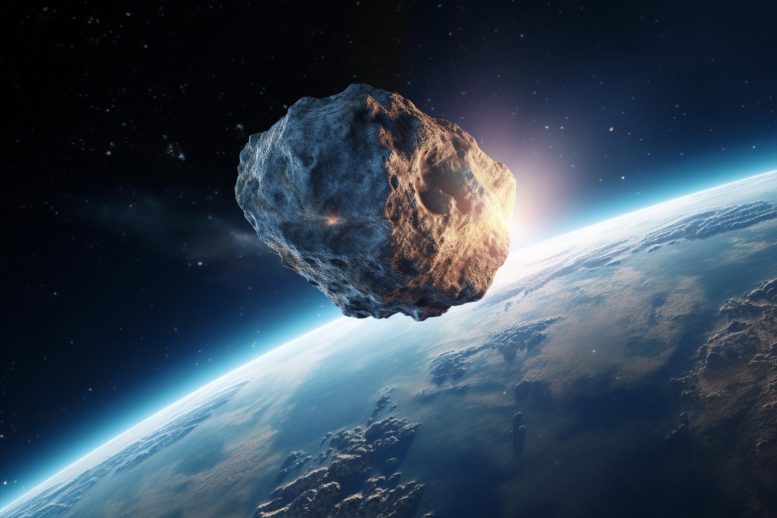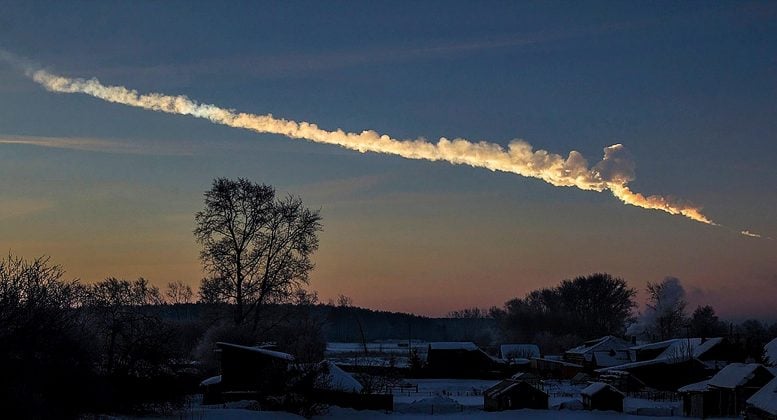How Dangerous Is the “Doomsday” Asteroid Swarm?
Scitech Daily ^ | November 02, 2024 | University of Maryland
Posted on 11/05/2024 5:39:17 AM PST by Red Badger

Recent research led by the University of Maryland using the Zwicky Transient Facility telescope has revealed that the Taurid swarm, a stream of space debris from the comet Encke, poses less of a threat than previously believed. Credit: SciTechDaily.com
========================================================================
New research indicates that the Taurid swarm contains fewer large asteroids than anticipated, suggesting a lower threat level.
This finding from observations using the Zwicky Transient Facility telescope informs both planetary defense strategies and our understanding of how comets and asteroids evolve.
Discovering the Taurid Swarm’s Secrets
Astronomers have promising news about potentially hazardous asteroids near Earth: there aren’t as many as previously thought.
Using the Zwicky Transient Facility (ZTF) telescope to scan large sections of the sky, a research team led by the University of Maryland examined a stream of space debris known as the Taurid swarm, which drifts close to Earth. The Taurid swarm, believed to be fragments of a large comet called Encke, appears from Earth as striking meteor showers each October and November. This area has long fascinated astronomers for its potential to hide dangerous asteroids, but until now, scientists could not confirm or disprove the existence of such hazards.
The team shared their findings at the American Astronomical Society’s Division for Planetary Sciences annual meeting in October 2024.

Comet Encke
This image taken by NASA’s Spitzer Space Telescope shows the comet Encke riding along its pebbly trail of debris. Every October, Earth passes through Encke’s wake, resulting in the well-known Taurid meteor shower. Credit: NASA/JPL-Caltech/University of Minnesota
Reassuring Findings on Asteroid Threats
“We took advantage of a rare opportunity when this swarm of asteroids passed closer to Earth, allowing us to more efficiently search for objects that could pose a threat to our planet,” said Quanzhi Ye, who supervised the project and is an assistant research scientist in UMD’s Department of Astronomy. “Our findings suggest that the risk of being hit by a large asteroid in the Taurid swarm is much lower than we believed, which is great news for planetary defense.”
Prior to this study, researchers speculated that the Taurid swarm contained a considerable number of large, kilometer-class space rocks left behind by a large object possibly up to 100 kilometers (62 miles) wide. Large objects can cause regional damage if they were to impact Earth, such as the Chelyabinsk asteroid that hit Russia and injured more than 1,600 people in 2013. Even larger objects can cause extinction-level events, such as the asteroid that killed the dinosaurs over 66 million years ago.

Chelyabinsk Meteor Exploded Over Russia
It is not uncommon for asteroids to hit Earth. In 2013, the Chelyabinsk meteor exploded over Russia, injuring hundreds. Credit: Alex Alishevskikh, CC BY-SA 2.0
Unveiling the True Scale of the Taurid Swarm
“Fortunately, we found that it’s likely there may only be a handful of asteroids—perhaps only nine to 14 of them—that fit this large size class in the swarm,” Ye explained. “Judging from our findings, the parent object that originally created the swarm was probably closer to 10 kilometers in diameter rather than a massive 100-kilometer object. While we still need to be vigilant about asteroid impacts, we can probably sleep better knowing these results.”
Insights Into Comet Encke and Planetary Evolution
According to Ye, the Taurid swarm holds important clues about planetary evolution, especially due to its connection to the comet Encke. Encke, which has the one of the shortest orbital periods (the time it takes to complete one rotation around the sun) of known comets at just 3.3 years, is also unusually large and dusty for a short-period comet (orbiting the sun in 200 years or less). Considering all available evidence, scientists believe that Encke experienced significant fragmentation in the past—and may continue to fall apart similarly in the future.
“Studying the Taurid swarm helps us understand how small celestial bodies like comets and asteroids form and break apart over time,” Ye said. “Our research has implications not just for asteroid detection and planetary defense, but also for our broader understanding of solar system objects.”
Future Steps in Asteroid Detection
While the study’s results are reassuring, the team believes that they also underscore the need for ongoing vigilance and improved detection capabilities. Using advanced facilities such as the ZTF telescope, which can efficiently conduct vast sky surveys and track potentially hazardous near-Earth objects, the researchers plan to conduct follow-up observations in the coming years when the Taurid asteroid swarm passes close to Earth again.
“We have opportunities in 2025 and 2026 to further refine our results,” Ye said. “As a result, we’re excited to continue this important work.”
Meeting: 56th annual meeting of the American Astronomical Society (AAS) Division for Planetary Sciences (DPS)
Led by Poolesville High School’s Jasmine Li and supervised by UMD, the research team also included scientists from the University of Western Ontario and the University of Washington, Seattle.
This study was supported by NASA (Program No. 80NSSC22K0772). This article does not necessarily reflect the views of this organization.
TOPICS: Astronomy; History; Military/Veterans; Weather
KEYWORDS:
Dear FRiends, Please use this temporary link to donate by credit card via Authorize.Net:
Or click here to donate by PayPal
Or by mail to: Free Republic, LLC - PO Box 9771 - Fresno, CA 93794
Hopefully, we'll have our normal CC system up and running again soon. Thank you very much for your loyal support!
1 posted on 11/05/2024 5:39:17 AM PST by Red Badger
To: MtnClimber; SunkenCiv; mowowie; SuperLuminal; Cottonbay
We’re all NOT GONNA DIE Ping!......................
2 posted on 11/05/2024 5:39:52 AM PST by Red Badger (Homeless veterans camp in the streets while illegals are put up in 5 Star hotels....................)
To: Red Badger
The News tonight: “”We declare Harris the winner!”
Me: “Help me Asteroid Swarm — you’re my only hope.”
3 posted on 11/05/2024 5:41:10 AM PST by ClearCase_guy (My decisions about people are based almost entirely on skin color. I learned this from Democrats.)
Disclaimer: Opinions posted on Free Republic are those of the individual posters and do not necessarily represent the opinion of Free Republic or its management. All materials posted herein are protected by copyright law and the exemption for fair use of copyrighted works.
FreeRepublic.com is powered by software copyright 2000-2008 John Robinson

 By Free Republic | Created at 2024-11-05 13:41:39 | Updated at 2024-11-05 15:37:32
1 hour ago
By Free Republic | Created at 2024-11-05 13:41:39 | Updated at 2024-11-05 15:37:32
1 hour ago








